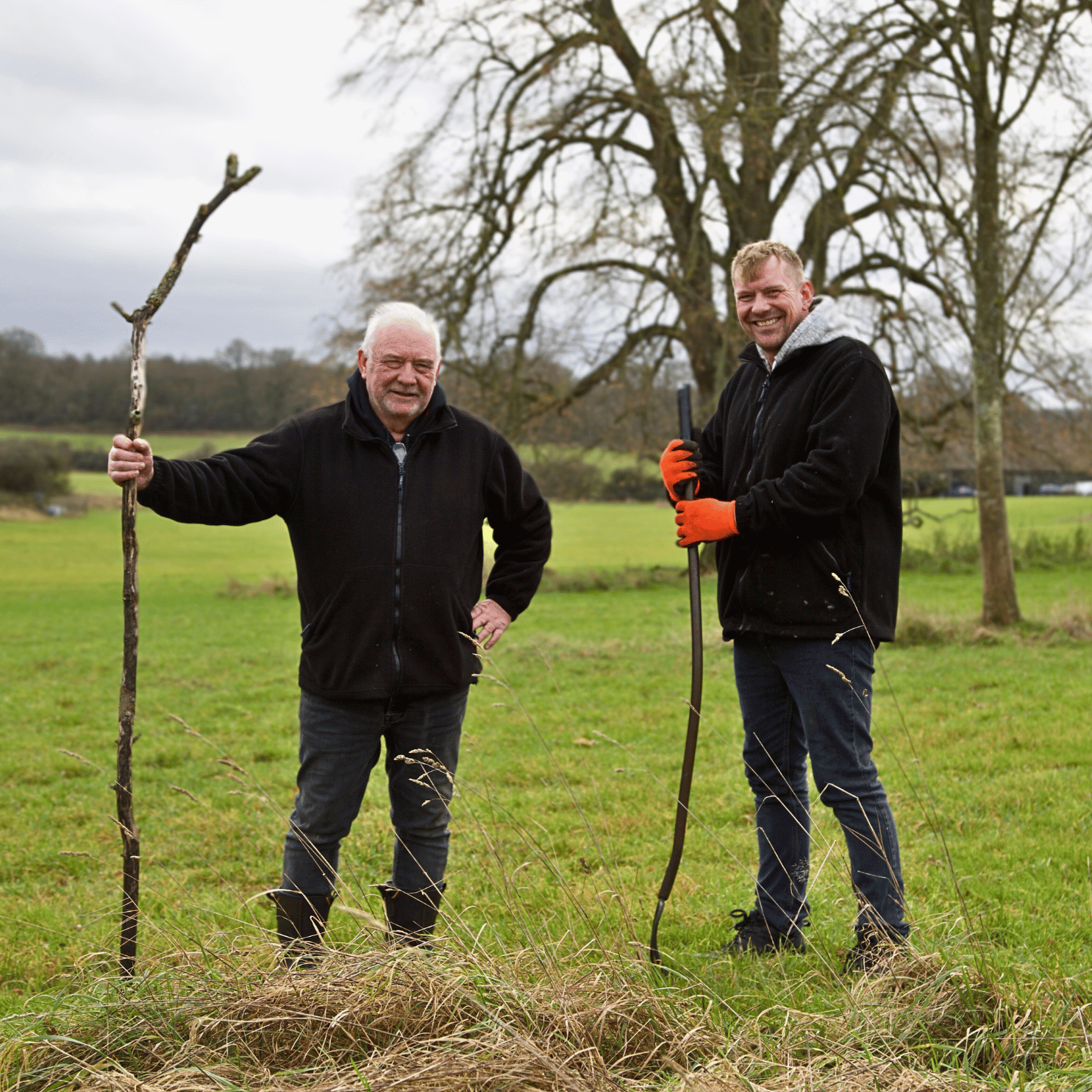Guardians Of the Estate

In the heart of the 160 acre Hildon estate, where the seasons set the pace, and Hildon water filters gently through the chalk strata, Royston and Damian stand as the vigilant stewards of this beautiful patch of Hampshire. This dynamic father and son duo are the Hildon groundskeepers.
Caring For The Land
Practical and resourceful, Royston has worked at Hildon for 20 years, across the business, and finds that whilst the seasons and jobs are cyclic, no two days are ever the same and life is always interesting.
As the custodians of the estate Royston and Damian are not mere landscapers; they are orchestrators of a delicate balance between man and nature. Here at Hildon we are always mindful of keeping sustainability central to all our operations.There are stunning lawns, a woodland garden and a walled garden around the house, but the majority of the estate is kept as a haven for wildlife.

Sustainably Minded
On this mid-December day, the duo is engaged in the timeless practice of hand-raking leaves, creating a mulch that not only clears leaves to allow grass growth and gathered around the trees to mulch, act as a natural deterrent for nettles. These leaves, create a lot of heat whilst mulching down and serve as a cosy refuge for the estate's older deer during colder months. The herd at Hildon currently number around 50.

Deer, being creatures of habit, rely on well-trodden routes through the estate. Royston and Damian ensure these pathways are clear. They shared an anecdote of a fawn entangled in a fence, a situation deftly handled with a calming touch, a sheet and a bowl of milk. Once calmed, they managed to liberate the dazed youngster back to the wild. On reflection realised that the fences on the deers habitual routes posed an issue to the younger deer, and so decided to strategically remove a portion of the fence, to remove the obstacle and potential dangers.
Caring for Nature
Hildon’s commitment to wildlife-friendly practices is not just about keeping most of the estate free of human intrusion, it is about fostering an environment where nature is allowed to thrive unhindered with just a little help where needed. Meanwhile, the grandeur of Hildon House grounds remains an exclusive sanctuary for humans, with magnolias, camellias, and towering redwoods. Though the formalities of yesteryear have given way to a more relaxed atmosphere, as any gardener knows, there is always work to be done. Cutting back the roses and wisteria, maintaining the lawns and fences that delicate dance between taming nature and letting it flourish. Moss can be very invasive – on the paths and tracks it can be dangerously slippery and can – in some cases – actually cause damage to pathways by lifting stones or creating cracks. Damian doesn’t use chemicals to deal with the moss, he steadfastly clears the moss with a handheld rotating brush - think of those machines for polishing large floors - but with an abrasive attachment. This means that no chemicals get into the land nor effects the wildlife, maintaining the integrity of the paths and tracks without compromising the delicate balance of the ecosystem. As they lead a tour through the grounds, they explain the majestic cloister of tree stumps — Woodhenge, remains of several trees that fell in storms a

few years back. These trunks, left in place, are a deliberate and ecologically sound practice, providing a habitat for wildlife, encouraging bioversity as well as helping prevent soil erosion. There is so much beauty here, but also so many challenges. This style of groundskeeping is very labour intensive, so Royston and Damian's are never idle. Currently, besides their everyday tasks, their focus is on preparing the old stables for the relocation of beehives in the spring. Advice from the local Romsey Beekeepers Association, has suggested that a more sheltered spot would suit the bees. Currently they are exposed to the elements and in a full sun location, so they are exerting a lot of energy either keeping the hives cool or warm. It will also shelter them from predators. So the floors in the stable need levelling, the edges need chicken wire to deter the rabbits and other rodents.
The field vacated by the hives is to become a vibrant wildflower meadow. Removing grass and topsoil to allow wildflower seeding serves several ecological purposes and supports the establishment and flourishing of a diverse wildflower meadow. Grasses can be aggressive competitors, often outcompeting wildflowers for sunlight, nutrients, and water. By removing the existing grass, you eliminate this competition, giving wildflower seeds a better chance to germinate and grow without hindrance. Wildflowers thrive in poorer soil conditions, which also reduces their competition. Royston and Damian commitment creates an harmonious blend of natural beauty and human stewardship. Their tale is not just one of groundskeeping but of a heartfelt commitment to preserving the delicate balance that makes Hildon a sanctuary for both wildlife and maintains the pristine nature of the estate that in turn gives us this unique, pure natural mineral water that is Hildon. Seems like a pretty good ROI to us!
Hildon is dedicated to sustainability, with our unwavering commitment evident in our membership with Planet Mark and our ambitious goal to achieve carbon neutrality by 2030, ensuring that environmental responsibility is at the heart of everything we do.


